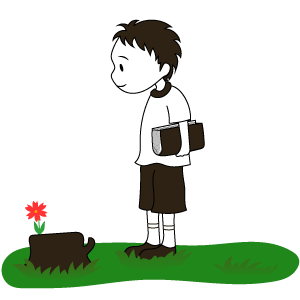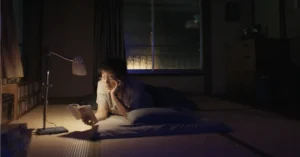Even if they call themselves hack writers, a term that has long since died out, in the end they are just ordinary creators who don’t sell.
You can’t make a living as a full-time novelist, and you don’t get a regular income as a writer.
It’s rumored that there are less than 50 people who make a living as a full-time novelist, including the fields of science fiction, children’s literature, and light novels.
The number who can successfully complete their lives as professional novelists is probably even smaller.
In this day and age, even if you win a famous award, it is a given that you will have a second job or a side job if you want to keep writing, and the first thing an editor will say to you after winning the award is apparently, “Don’t ever quit your job (your main job).”
In the past, the profession of novelist was socially recognized as a respectable profession, although not on the same level as a firefighter or police officer. Naturally, it was also listed as one of the professions that children wanted to become.
“I will be a writer someday.”
That didn’t mean a second job like today, but a full-time career. In the list of high taxpayers that used to be published in newspapers, there was a section for novelists, such as Akagawa Jiro and Yoshimoto Banana.
However, time passed and the publishing industry fell into a recession.
Bookstores disappeared, and not only did books stop selling, but the number of people who read books also decreased.
This seems to be a global trend, not just in Japan.
However, even if they were naive and had no future prospects, those who dreamed of becoming a novelist when they grew up and aspired to make it their lifelong career look at the current situation, and no matter how much they understand it intellectually, I think there are quite a few who feel that it’s a lie or a scam (at least I feel that way).
This is an old story, but back when literary magazines and youth fashion magazines were selling well, they often carried articles about famous and popular writers’ hobbies, flashy friendships, and the glamorous lives of lavish travels around the world, eating delicious food, and making movies.
As a child, I admired that lifestyle and naively assumed that if I became a successful novelist, I’d be able to enjoy all of these things freely.
However, now the magazine itself isn’t selling well, and there are no articles about the glamorous life of a writer, even in online news. All you find are tales of hardship and life advice.
Of course, I’m sure there are people who started writing with the lofty goal of leaving their mark in the history of world literature or creating works that will last forever (this is also very important), but even so, I’m sure that at one point they admired and dreamed about these stories of successful novelists.
Of course, professional writers have not become extinct, they have simply become fewer in number, and as long as there are people who can make a decent living,
it’s fine to say, “Why don’t you just work harder and write things that sell,” but I can’t help but feel like the ladder to a somewhat glamorous world has suddenly been taken away from you.
When we turned 20, we were told that if we paid into our pensions properly for the next 40 years, we would receive a pension that would allow us to live comfortably from the age of 60, but now that we are in the Reiwa era, we will start receiving it at 65, and it is said that we may even reach 70. It is somewhat similar to the disappointment and dejectedness felt by this situation.
Of course, the decline of the publishing industry is not the fault of the government, and the government cannot do anything about it any more than the declining home electronics industry can.
No matter how loudly we shout about reading more books, people who don’t read won’t read books.
So what about e-books? No matter how popular they become, their rivals will be the games and video apps that are lined up on smartphones. The competition is tough.
As Goethe said (and Suzuki Yui’s “Goethe Said It All” is amazing), he said that a civilization in which literature declines will perish, but according to this logic, human civilization itself may be on the verge of perishing.
There’s no point complaining about the global trend, but even though I’m determined to write good works, at the same time, in the back of my mind, I naturally simulate how many copies of the first edition will be published, so the royalties will be, how much if there are reprints, how many works I can write per year, and what my income will be.
Looking at it this way, the act of writing a novel is a field that is quite inferior in terms of the currently popular terms of “type” and “cost-effectiveness” (really nasty words). Well, literature is great because it is the exact opposite of what these words mean.
That brings us back to the original point: if you want to make it as a writer, you have to have a second job, a side job.
That also means that literature becomes more like a hobby or a side gig. If that happens, fewer people will risk their lives to pursue it, and it’s obvious that the quality of novels will decline.
Because you can’t make a living from it. Those words have a strong connotation.
However, writing novels is a fun activity. Even if you don’t have high hopes of making your name in literary history, if you can just accept it as a side job or a hobby from the start, I think it’s a hobby that I would recommend to a certain extent.
However, it is highly doubtful that the works that result from this will be historic works. Works such as Tsurezuregusa and Hōjōki, which seem to have been born from the side-jobs of hermits, can be said to be true strokes of luck.
In the end, we may be proving the truth of the saying that bad money drives out good money. And before you know it, literature will become all about hobbies, and there will be more writers than readers.
So what can be done about this situation? For now, how about reducing literary prizes by a tenth of their current size?
For now, we should reduce the number of prizes for revitalizing towns that exist in each prefecture, city, and town across the country. The Akutagawa Prize should also be awarded once a year as a new writer’s prize, co-sponsored by all publishers.
What if the Bookstore Award and other big awards were combined into one award given to veterans, and instead the greatest honor and a large prize were set. A big award ceremony would be held on TV or some other medium.
Like the Pulitzer Prize in the US.
Just like the M1 Grand Prix has become a brand in the comedy world, a large prize could be plentiful and become established as a stepping stone to success.
Those who create truly great works would be rewarded with plenty of money and honor. Personally, I think it would be great to have such a system.
But wouldn’t that make things even harder for people like you who write niche children’s literature? Well, that’s all I can say…
“Literary awards, give us more money and honor”











